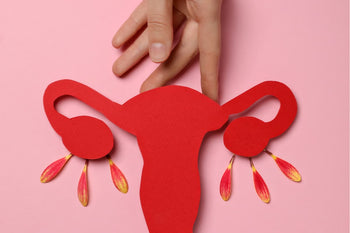

The decision has been made; you want a child. You go for it full of energy, but despite several attempts it still doesn't seem to work.
Secretly quite a disappointment, but absolutely no reason to throw in the towel. It is quite normal that you do not 'hit the mark' right away.
Let's dive into the topic of fertility once again, this time focusing on the fertility of, yes, the man!
Contents
Often or little sex?
That patience is a virtue also applies to reproducing your genes. Getting pregnant can be a time-consuming task.
Most experts believe that it is best to have sex no more than once a day. Optimal sperm counts are achieved by ejaculating once every two to five days.
Around a woman's fertile period, it is wise to have sex every other day to increase the chance of conception.
Too frequent ejaculations (multiple times a day) can reduce the number of sperm cells per ejaculation. The quality does not necessarily have to suffer. On the other hand: too few ejaculations can reduce the motility of the sperm. Find your Balance!
Don't forget: sex is fun
It is important that it remains fun. Try to be relaxed about it; it is not conducive to be strictly on schedule and to see sex as a must or routine job. Of course it is useful to keep an eye on ovulation, but do not forget to change things up sometimes. Try new things, surprise each other, give each other attention and keep communicating (also about this subject).
Fertility: Is it the eggs or is it the sperm?
If the pregnancy does not occur, you can investigate what the cause is. Assuming that no one is the 'guilty' person here...
First a lesson in fertility. Both men and women become fertile during puberty. Female fertility is also a hereditary issue. For example, it depends on how many eggs a woman received during birth.
At birth, a man only has precursors of sperm cells, also called stem cells, in his testicle. Sperm production begins at puberty. Mature sperm cells are discharged and together with extra fluid they form the ejaculation. The development of sperm cells is a continuous process that takes about 75 days.
Fertility & Age
Women and men are most fertile in their twenties. For women, this is about the same until they are thirty, after which fertility slowly declines.
As we know, women have difficulty getting pregnant after the age of 40. Men, on the other hand, retain their fertility, but the quality of their sperm decreases. The quality only decreases later. After the age of 45, men often take longer to impregnate a woman.
Infertility is often looked at the woman. However, it can certainly also be the man's fault. The big question today is: 'how do you increase male fertility?'.
The fertility of men
Several criteria play a role in the quality of the seed:
The number of sperm cells
There must be enough sperm cells. Or are there enough for good fertility? The quality is considered 'normal' at a minimum of fifteen million sperm cells per milliliter. Fewer sperm cells per milliliter are considered less fertile. Which does not mean that no egg cell can be fertilized with it
The shape of the seed
Are the sperm cells good in shape? Huh, in shape? Yes, sperm cells with the most favorable shape have a greater chance of fertilizing the egg. Every man has sperm cells that have a less than optimal shape, but if there are too many, this will affect fertility
Sperm Motility
Are the sperm cells active enough and able to reach the egg? They have to be able to travel quite a distance. Through the vagina, through the cervix. And then through the uterus to the fallopian tubes. Fertilization usually takes place in the fallopian tube.
Increase male fertility?
How does that work exactly? There can be various causes for reduced fertility in men.
It can be due to lifestyle, age (from about 45) but sometimes also a congenital defect. Disease also affects the quality of the sperm. You can think of a flu, but also of serious illnesses. You can never rule out the latter, but there is a big chance that it is due to something else.
Lifestyle
Smoking, excessive alcohol consumption and drug use all have a negative effect on the quality of the sperm. Besides the fact that it is healthy to stop smoking and drink alcohol in moderation, the sperm does not improve either.
Furthermore, sitting a lot and not moving much is also not good for fertility. The testicles become warmer when sitting than when they are hanging freely. For example, it has been proven that truck drivers are less fertile.
You probably guessed it: healthy food does promote fertility. Fresh and unprocessed food, lots of fibers such as whole grain products and lots of vegetables.
In addition to nutrition, fertility supplements for men can also be a good addition. Vitamin C and zinc supplements have a positive effect on the sperm. Zinc is a mineral and plays an important role in male fertility and has an influence on the formation of sperm. A zinc supplement can certainly be a good addition in case of reduced sperm quality.
Stress and fertility
Also try to avoid stress. You can do this by consciously seeking relaxation. Paying attention to your diet and taking stress-reducing supplements . Finally: being overweight affects the testosterone in the body. So try to maintain a healthy weight and your sperm cells will thank you!
Other causes
Of course, it is possible that someone is in top shape, both mentally and physically, and that the pregnancy still does not occur. Perhaps there is something else going on. Certain medications, such as antibiotics or substances such as steroids have a negative impact on fertility.
But working with chemical and/or radioactive substances can also have an effect. In the latter case, visit the company doctor to discuss this.
If you are unable to conceive after a year of trying, visit your GP. He or she will ask you a few questions and possibly perform tests. The sperm will be examined and sometimes a physical examination will be performed. If necessary, you will be referred to a gynaecologist or fertility specialist.
Know that one in six couples have difficulty conceiving. So you are definitely not alone and certainly not 'abnormal'.

























